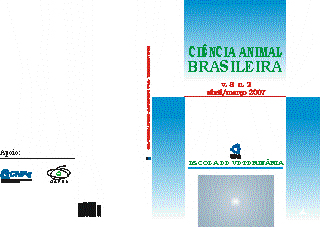PRODUCTION AND CHEMICAL-BROMATOLOGICAL COMPOSITION OF Brachiaria Brizantha CV. MARANDU FERTILIZED wITH SUINE LIQUID wASTE
Keywords:
Dejetos de suínos, adubação orgânicaAbstract
The present work evaluated the effects of the ap-plication of different amounts of liquid pig waste (LPw) in the manuring of Brachiaria brizantha cv. Marandu in relation to the chemical manuring usually recommended, as the production and composition chemist - bromatológica during the period from January at April/00. The treatments consisted of T1 = it controls, T2 = chemical manuring (60 kg/ha of N in form of sulfate of ammonium, 30 kg/ha of P in form of simple superfosfato and 37,5 kg/ha of K in form of potassium chloride), T3 = 50 m³/ha, T4 = 100 m³/ha and T5 = 150 m³/ha, being the LPw,manurings divided in three applications. The used experimental deli-neament was it of blocks complete casualizados, with four repetitions. They were appraised: production of dry matter (PMS) (kg/ha), medium tenors of rude protein (PB), fiber in neutral detergent (NDF), fiber in acid detergent (ADF) and hemicelulose (HC), besides the medium tenors of the macrominerals: match (P), potassium (K), calcium (Ca) and magnesium (Mg). The manuring with dejections and the chemical manuring provided significant increments in PMS of the grass Marandu. The application of LPW influenced the composition bromatologyc of the forage, as well as the chemical composition. For the found results the application of 150 m3 of DLS can be recommended to substitute the recommended chemical manuring.
KEY-WORDS: ADF, cruden protein, mineral macroelements, NDF, production of dry mater.
Downloads
Downloads
Published
How to Cite
Issue
Section
License
Copyright (c) 2007 Brazilian Animal Science/ Ciência Animal Brasileira

This work is licensed under a Creative Commons Attribution 4.0 International License.
Authors who publish with this journal agree to the following terms:
- Authors retain copyright and grant the journal right of first publication with the work simultaneously licensed under a Creative Commons Attribution License that allows others to share the work with an acknowledgement of the work's authorship and initial publication in this journal.
- Authors are able to enter into separate, additional contractual arrangements for the non-exclusive distribution of the journal's published version of the work (e.g., post it to an institutional repository or publish it in a book), with an acknowledgement of its initial publication in this journal.
- Authors are permitted and encouraged to post their work online (e.g. in institutional repositories or on their website) prior to and during the submission process, as it can lead to productive exchanges, as well as earlier and greater citation of published work (See The Effect of Open Access).




























